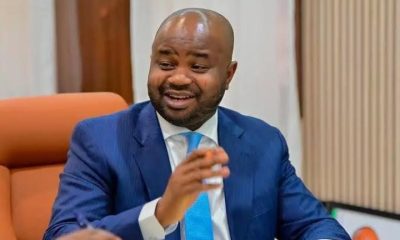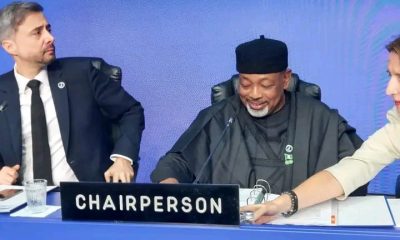National
Army HQ Defies Court, Insists On 15-Year Minimum Service For Voluntary Retirement

By Miracle Esegha, Bauchi
Despite the recent court ruling, the Nigerian Army has insisted that the Armed Forces of Nigeria will continue to enforce the contentious 15-year minimum service requirement for personnel seeking voluntary retirement.
The ruling was delivered on Tuesday, September 2, 2025, by Justice Emmanuel D. Subilim in Suit No: NICN/ABJ/25/2025, filed by fiery Lagos-based human rights lawyer, Inibehe Effiong, on behalf of his client, Flight Lieutenant J. A. Akerele.
The court held that officers of the Nigerian military cannot be forced into “modern-day slavery under the guise of national service,” insisting that members of the Armed Forces have the constitutional right to resign at any time.
The case had the Chief of Air Staff and the Nigerian Air Force joined as the 1st and 2nd defendants.
Justice Subilim ruled that the military’s insistence on a 15-year compulsory service period is not only oppressive but also violates the constitutional rights of personnel.
Flight Lieutenant Akerele, commissioned in 2013 as a Pilot Officer by then-President Goodluck Jonathan, narrated in his affidavit how he was subjected to “systematic persecution and victimisation” by the Nigerian Air Force authorities after seeking disengagement.
Akerele said, “Before the 14th day of September 2013, I was selected based on merit as a final year student in the Nigerian Defence Academy in July 2013 to complete my Flight training in the United States of America. During the course of my studies, allowances were no longer released for about (5) five months and I was abruptly recalled from the course in July 2014, and this led to my loss of seniority in rank, and I was not assigned to any unit for over a year.
“I switched 5 (five) different career paths as a young officer in the Nigerian Air Force, and during this course, I was never promoted as compared to my course mates, as I spent 6 (six) years on the rank of a Flying Officer instead of the standard 4 (four) years.”
The court concluded that no citizen can be compelled to remain in service against their will.
The judgment quickly stirred reactions both inside and outside the military, coinciding with recent protests by retired soldiers over unpaid entitlements and growing discontent among serving officers about poor welfare and stalled career progression.
But speaking to journalists in Abuja on Thursday, the Director of Defence Media Operations, Maj. Gen. Markus Kangye maintained that the Armed Forces would continue to uphold the provisions of HTACOS until they were formally amended.
“The Armed Forces of Nigeria has a document which refers to our conditions and terms of service. In that document, everything regarding the disengagement of personnel is spelled out. Unless the terms and conditions of service are rewritten, we will still go by what is contained in that document,” Kangye said.
He explained that the 15-year service clause applied differently depending on the mode of entry into the military, stressing that each category of personnel — soldiers, cadets, and officers on short-service or direct short-service commissions — is bound by distinct obligations agreed upon at the point of entry.
According to him, soldiers typically enlist through recruitment depots, while officers join through the Nigerian Defence Academy as regular combatant cadets.
Graduates enter via the Short Service Commission, while professionals such as doctors, lawyers, and accountants join under the Direct Short Service scheme.
“Whichever applies to you at the point of entry is what governs your service until disengagement,” Kangye explained.
Flight Lieutenant Akerele, commissioned in 2013 as a Pilot Officer by then-President Goodluck Jonathan, narrated in his affidavit how he was subjected to “systematic persecution and victimisation” by the Nigerian Air Force authorities after seeking disengagement.
Akerele said, “Before the 14th day of September 2013, I was selected based on merit as a final year student in the Nigerian Defence Academy in July 2013 to complete my Flight training in the United States of America. During the course of my studies, allowances were no longer released for about (5) five months and I was abruptly recalled from the course in July 2014, and this led to my loss of seniority in rank, and I was not assigned to any unit for over a year.
“I switched 5 (five) different career paths as a young officer in the Nigerian Air Force, and during this course, I was never promoted as compared to my course mates, as I spent 6 (six) years on the rank of a Flying Officer instead of the standard 4 (four) years.”
The court concluded that no citizen can be compelled to remain in service against their will.
The judgment quickly stirred reactions both inside and outside the military, coinciding with recent protests by retired soldiers over unpaid entitlements and growing discontent among serving officers about poor welfare and stalled career progression.
But speaking to journalists in Abuja on Thursday, the Director of Defence Media Operations, Maj. Gen. Markus Kangye maintained that the Armed Forces would continue to uphold the provisions of HTACOS until they were formally amended.
“The Armed Forces of Nigeria has a document which refers to our conditions and terms of service. In that document, everything regarding the disengagement of personnel is spelled out. Unless the terms and conditions of service are rewritten, we will still go by what is contained in that document,” Kangye said.
He explained that the 15-year service clause applied differently depending on the mode of entry into the military, stressing that each category of personnel — soldiers, cadets, and officers on short-service or direct short-service commissions — is bound by distinct obligations agreed upon at the point of entry.
According to him, soldiers typically enlist through recruitment depots, while officers join through the Nigerian Defence Academy as regular combatant cadets.
Graduates enter via the Short Service Commission, while professionals such as doctors, lawyers, and accountants join under the Direct Short Service scheme.
“Whichever applies to you at the point of entry is what governs your service until disengagement,” Kangye explained.
The Defence Headquarters’ stance sets the stage for a legal confrontation between the armed forces and personnel seeking to rely on the court ruling to resign before completing the mandatory 15 years.













